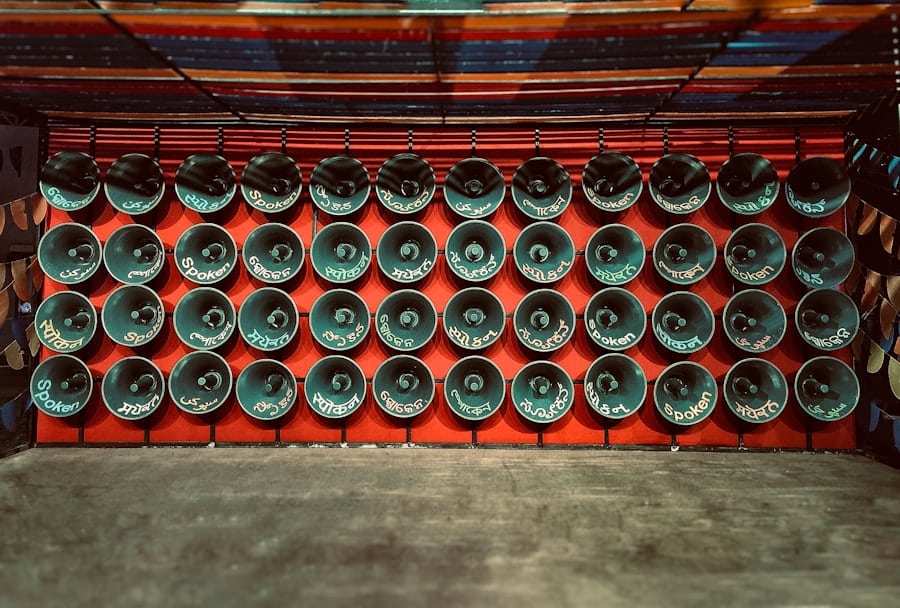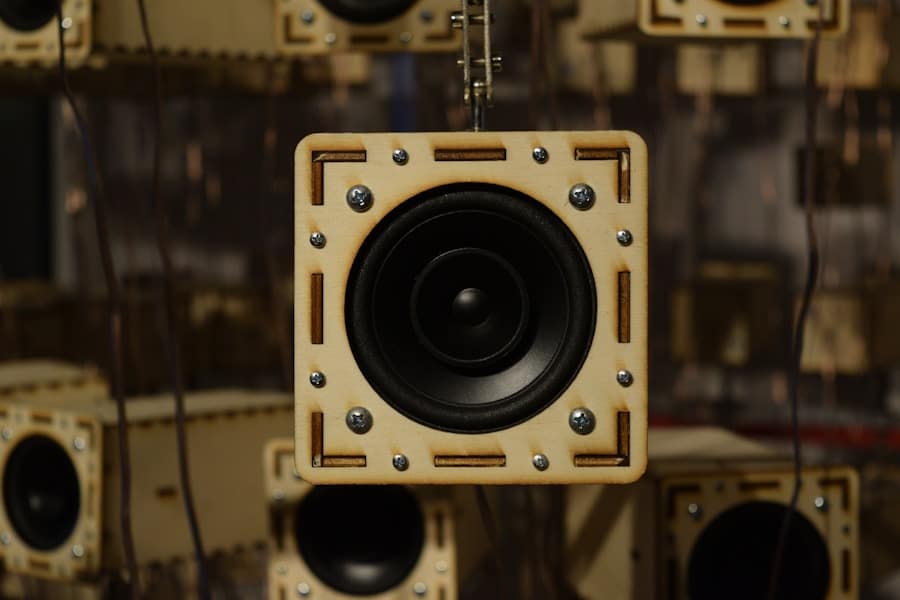The advent of artificial intelligence has revolutionized numerous fields, and the audio industry is no exception. AI-powered sound engines represent a significant leap forward in how sound is generated, manipulated, and experienced. These sophisticated systems utilize machine learning algorithms to analyze audio data, enabling them to create, modify, and enhance sound in ways that were previously unimaginable.
By leveraging vast datasets and complex neural networks, these engines can produce high-quality audio that adapts to the listener’s environment and preferences, thereby creating a more immersive auditory experience. The integration of AI into sound engineering has opened up new avenues for creativity and innovation. Traditional sound design often relies on manual processes that can be time-consuming and limited by the designer’s skill set.
In contrast, AI-powered sound engines can automate many of these processes, allowing for rapid experimentation and iteration. This not only accelerates the production timeline but also empowers artists and sound designers to explore new sonic landscapes that may have been overlooked in conventional workflows. As we delve deeper into the capabilities of these engines, it becomes clear that they are not merely tools but rather collaborators in the creative process.
Key Takeaways
- AI-powered sound engines use artificial intelligence to create dynamic and immersive audio experiences.
- AI plays a crucial role in analyzing and processing audio data to generate personalized and adaptive soundscapes.
- The advantages of AI-powered sound engines include real-time adaptation, personalization, and enhanced user engagement.
- AI-powered sound engines have applications in various industries such as gaming, virtual reality, healthcare, and automotive.
- Challenges and limitations of AI-powered sound engines include data privacy concerns, ethical considerations, and potential biases in audio generation.
The Role of AI in Creating Dynamic Audio Experiences
AI plays a pivotal role in crafting dynamic audio experiences by enabling real-time sound generation and manipulation. Through techniques such as deep learning and neural synthesis, AI can analyze audio inputs and generate outputs that are contextually relevant. For instance, in video games, AI can adapt the soundtrack based on the player’s actions or the game’s environment, creating a more engaging experience.
This adaptability is achieved through algorithms that learn from player behavior, allowing the sound to evolve in tandem with the gameplay. Moreover, AI can enhance audio experiences in various settings by personalizing soundscapes to individual preferences. By analyzing user data, such as listening habits and environmental factors, AI-powered sound engines can tailor audio output to suit specific contexts.
For example, a smart speaker equipped with an AI sound engine can adjust its audio settings based on the time of day or the listener’s mood, providing a customized auditory experience that resonates with the user on a personal level. This level of personalization not only enriches the listening experience but also fosters a deeper connection between the user and the audio content.
Advantages of AI-Powered Sound Engines

One of the most significant advantages of AI-powered sound engines is their ability to produce high-quality audio with remarkable efficiency. Traditional sound design often involves extensive manual labor, requiring sound engineers to painstakingly edit and mix tracks to achieve the desired outcome. In contrast, AI can automate many of these tasks, significantly reducing production time while maintaining or even enhancing audio quality.
For instance, AI algorithms can analyze existing sound libraries and generate new sounds that fit seamlessly into a project, allowing creators to focus on higher-level artistic decisions rather than getting bogged down in technical details. Another notable advantage is the potential for innovation in sound design. AI-powered engines can generate sounds that are entirely new and unique, pushing the boundaries of what is sonically possible.
By utilizing generative models, these engines can create complex audio textures that would be difficult or impossible for human designers to conceive.
As a result, AI-powered sound engines are fostering a new era of creativity in music production, film scoring, and other audio-related fields.
Applications of AI-Powered Sound Engines in Different Industries
AI-powered sound engines have found applications across a diverse range of industries, each leveraging their capabilities to enhance audio experiences in unique ways. In the gaming industry, for example, developers are increasingly utilizing AI to create adaptive soundscapes that respond to player actions in real-time. This dynamic approach not only heightens immersion but also allows for a more personalized gaming experience.
Games like “Hellblade: Senua’s Sacrifice” have employed AI-driven audio techniques to create a hauntingly realistic auditory environment that reflects the protagonist’s mental state. In the realm of film and television, AI-powered sound engines are transforming post-production processes. Sound designers can use these tools to quickly generate Foley effects or background ambiances that match specific scenes without extensive manual input.
For instance, an AI engine might analyze a scene’s visual elements and automatically suggest or create sounds that enhance the narrative impact. Additionally, music composition for film scores is being revolutionized by AI algorithms capable of generating original compositions tailored to specific emotional cues within a scene. The healthcare industry is also beginning to explore the potential of AI-powered sound engines.
For example, researchers are investigating how these technologies can be used in therapeutic settings, such as creating personalized soundscapes for patients undergoing treatment for anxiety or depression. By analyzing patient responses to different auditory stimuli, AI can help develop tailored sound environments that promote relaxation and well-being.
Challenges and Limitations of AI-Powered Sound Engines
Despite their numerous advantages, AI-powered sound engines face several challenges and limitations that must be addressed for their full potential to be realized. One significant concern is the quality of the training data used to develop these systems. Machine learning algorithms rely heavily on large datasets to learn patterns and generate outputs.
If the training data is biased or lacks diversity, it can lead to subpar results or reinforce existing stereotypes within audio content. For instance, an AI trained predominantly on Western music may struggle to accurately generate sounds representative of other cultural traditions. Another challenge lies in the interpretability of AI-generated outputs.
While these engines can produce impressive results, understanding how they arrive at specific audio decisions can be opaque. This lack of transparency raises questions about accountability and trust in AI-generated content. In creative fields where artistic intent is paramount, it is crucial for artists and producers to comprehend how an AI system operates to ensure that its outputs align with their vision.
Future Developments and Innovations in AI-Powered Sound Engines

Conversational Control over Audio Creation
One area of innovation is the integration of natural language processing (NLP) with audio generation capabilities. This convergence could enable users to interact with sound engines using conversational language, allowing for more intuitive control over audio creation processes. Imagine a scenario where a filmmaker could simply describe the desired mood or atmosphere for a scene, and the AI engine would generate an appropriate soundtrack based on that input.
Enhanced Responsiveness in Live Settings
Advancements in real-time processing capabilities will likely enhance the responsiveness of AI-powered sound engines in live settings. Musicians and performers could leverage these technologies during concerts or events to create dynamic soundscapes that evolve alongside their performances. This could lead to entirely new forms of live music experiences where audience engagement is heightened through interactive audio elements generated on-the-fly.
Responsible Use of AI in Creative Industries
Furthermore, as ethical considerations surrounding AI continue to gain prominence, there will likely be increased focus on developing frameworks for responsible use of these technologies in creative industries. This could involve establishing guidelines for transparency in AI-generated content and ensuring that artists retain ownership over their work when collaborating with AI systems.
Ethical Considerations in the Use of AI-Powered Sound Engines
The rise of AI-powered sound engines brings forth important ethical considerations that must be navigated carefully by creators and industry stakeholders alike. One pressing issue is intellectual property rights concerning AI-generated content. As these systems become more capable of producing original works, questions arise about who owns the rights to such creations—the artist who collaborated with the AI or the developers behind the technology?
Establishing clear guidelines around ownership will be essential to protect artists’ interests while fostering innovation. Moreover, there are concerns regarding the potential for misuse of AI-generated audio content.
For instance, deepfake technology has already demonstrated how easily audio can be altered to misrepresent individuals’ voices or statements. As AI-powered sound engines become more sophisticated, ensuring responsible usage will be critical in preventing harmful applications that could undermine trust in media. Additionally, there is a need for inclusivity within the development process of these technologies.
Ensuring diverse representation among creators and stakeholders involved in designing AI systems will help mitigate biases present in training data and outputs. By fostering an inclusive environment where various perspectives are valued, the industry can work towards creating more equitable and representative audio experiences.
The Impact of AI-Powered Sound Engines on the Future of Audio Experiences
AI-powered sound engines are undeniably reshaping the landscape of audio experiences across multiple domains. Their ability to generate dynamic, personalized soundscapes has opened up new possibilities for creativity while streamlining production processes. As industries continue to explore innovative applications for these technologies—from gaming and film to healthcare—the potential for transformative change remains vast.
However, as we embrace these advancements, it is crucial to remain vigilant about ethical considerations surrounding their use. Addressing issues related to intellectual property rights, transparency, and inclusivity will be essential in ensuring that the benefits of AI-powered sound engines are realized responsibly and equitably. The future holds immense promise for these technologies as they continue to evolve; their impact on how we create and experience sound will undoubtedly shape our auditory landscape for years to come.
If you’re interested in learning more about the latest technology trends, you should check out TheNextWeb Brings Insights to the World of Technology. This article provides valuable insights into the world of technology and how it is shaping our future. It’s a great read for anyone looking to stay informed about the latest developments in the tech industry.
FAQs
What are AI-powered sound engines?
AI-powered sound engines are advanced software systems that use artificial intelligence algorithms to analyze and process audio data in real time. These engines can generate dynamic and responsive audio experiences by adapting to user inputs and environmental factors.
How do AI-powered sound engines create dynamic audio experiences?
AI-powered sound engines use machine learning and deep learning techniques to analyze audio inputs and generate responsive outputs. These engines can adjust the audio based on user interactions, environmental conditions, and other contextual factors, creating immersive and personalized audio experiences.
What are the applications of AI-powered sound engines?
AI-powered sound engines have a wide range of applications, including in video games, virtual reality experiences, augmented reality applications, interactive media installations, and smart devices. These engines can enhance the audio experience by creating realistic and adaptive soundscapes.
What are the benefits of using AI-powered sound engines?
Using AI-powered sound engines can result in more immersive and engaging audio experiences for users. These engines can adapt to user preferences and environmental conditions, creating personalized and dynamic audio content. Additionally, AI-powered sound engines can improve accessibility and inclusivity by providing tailored audio experiences for individuals with different needs.

